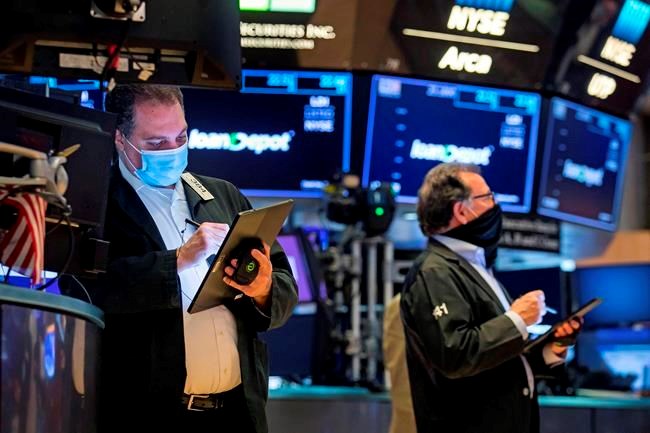TORONTO — When the bottom fell out of North American stock markets a year ago, few investors would have imagined how unsettled the world would remain a year later, even after a massive financial rebound.
People were in panic mode back in February and March of 2020, recalls Candice Bangsund, portfolio manager for Fiera Capital.
"Investors were liquidating their portfolios aggressively in response to the uncertainty and the unprecedented nature of the pandemic," she said in an interview. "As a result, a lot of investors likely missed the corresponding upturn that ensued."
When Bangsund and other market-watchers look back at the past year, a reminder for nervous investors to hang on for the long term even during the wildest market gyrations is an often-repeated takeaway.
The The Toronto Stock Market lost 38 per cent of its value in four weeks in early 2020, including three days in which it fell by more than 1,000 points. On March 23, it plunged to a low of 11,172 points.
"March was particularly crazy," said Colin Cieszynski, chief market strategist at SIA Wealth Management. "It was hard to get a read on anything because markets were gyrating so much.
"Forget about day to day, from hour to hour."
Unprecedented moves by global central banks to cut interest rates to rock-bottom levels and subsequent fiscal stimulus prevented a depression and provided needed support for the rebound and very lucrative market conditions that currently exist.
Investors were not expecting that type of unprecedented policy response, said Bangsund.
"The timing and the magnitude of the support completely exceeded expectations and has been a key source of that upswing that we saw through 2020." By August of 2020, markets were well into rebound territory.
Now, stock indexes have gone on to set record highs — the S&P 500 closed above 4,000 points for the first time on Thursday — with analysts predicting continued growth throughout the year.
"At the end of the year things were actually positive and a relatively good year. Obviously it was a roller-coaster ride of a generation, or a lifetime," said Allan Small, senior investment adviser at IA Private Wealth.
Technology led during the downturn as companies tied to people working from home prospected. Ottawa based Shopify Inc. became the most valuable company on the TSX as retailers rushed to open online versions of their stores. The technology sector also provided a defensive tool to offset declines when markets soured.
But like Bangsund, Small believes some Canadian investors missed out on the recovery by bailing out too soon or moving to defensive positions.
"I think those that bailed fully they were sorry they did. Those that hung into the market, obviously they were rewarded for doing so."
Small said he was able to convince all of his clients to at a minimum stay the course, while many increased their investments.
"All my clients were happy they did and for those that added, they were even happier."
The number of Canadian stock market transactions surged throughout 2020, according to monthly trading statistics from the TMX, which operates the Toronto Stock Exchange, TSX Venture Exchange, TSX Alpha Exchange and Montreal Exchange.
The number of transactions more than doubled to 57.5 million while their value surged almost 80 per cent to $350.8 billion in March from $195.4 billion in March 2019. For all of 2020, the value of transactions increased 34 per cent to $2.5 trillion.
Similar growth was seen across North American stock exchanges, particularly from retail investors interested in technology and life sciences.
Sales of mutual funds and ETFs (exchange traded funds) also increased, although they dipped during the depth of market sell-off, according to data from the Investment Funds Institute of Canada.
The past year reinforces why people were wise to invest throughout the turmoil, said Crystal Maloney, head of equity research at CIBC Asset Management.
"If you aren't invested during these key times of recovery, you can give up a lot of your long-term returns as we've seen time and time again."
The level of trading activity is a good indication that people were positioning more defensively last year and then switched to the reopening trade in anticipation of vaccine development and inoculations, she said.
While the financial market response to the onset of the pandemic was not typical, it would have been understandable if markets had fallen even more sharply than they did, said Eric Lascelles, chief economist at RBC Global Asset Management.
"Indeed, it was a source of some frustration for savvy investors that there was not a juicier buying opportunity last spring," he said in an email.
The stock market normally significantly overreacts to economic shocks, but this time the response was more rational than usual.
That's because the market learned important lessons from the prior decade when equities fell too far during the global financial crisis. And this time, the pandemic was inherently artificial, with governments restricting activities and providing unprecedented stimulus that curtailed distress.
While a market rebound well in advance of the underlying economy is normal, the degree of enthusiasm was unusual so soon after a recession, he said.
"We expect further rapid growth over the next few years, and ultimately little scarring," Lascelles said, adding that while valuations are high by historical standards, they are attractive compared with the ultra low-yield bond market.
"In other words, the risk premium enjoyed by equity-holders remain sufficiently large to make current valuations tolerable and likely sustainable."
This report by The Canadian Press was first published April 4, 2021.
Ross Marowits, The Canadian Press



